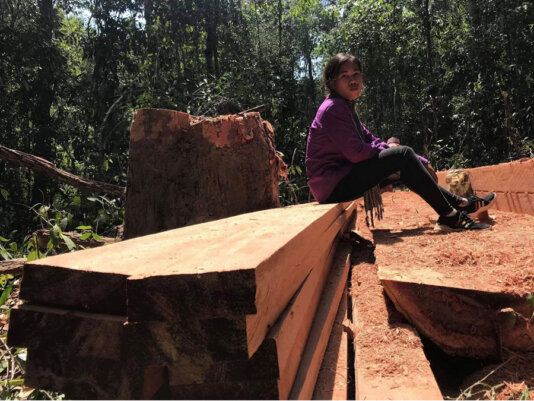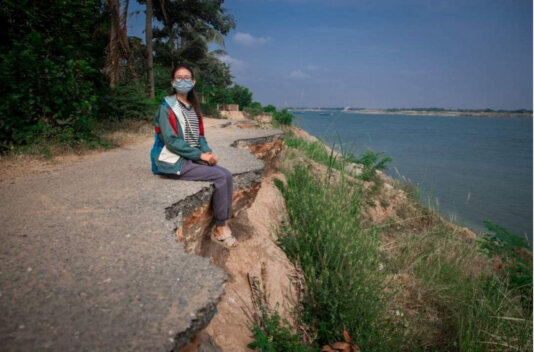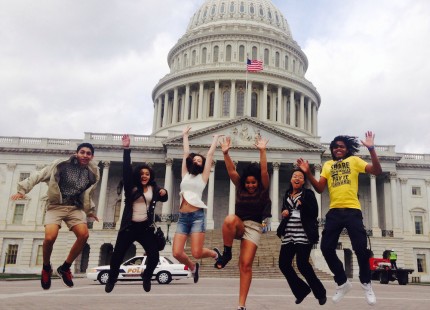- About
- Topics
- Story
- In-Depth
- Picks
- Opinion
- News
- Donate
- Signup for our newsletterOur Editors' Best Picks.Send
Read, Debate: Engage.
| March 03, 2022 | |
|---|---|
| topic: | Climate action |
| tags: | #Cambodia, #activism, #climate justice, #democracy |
| located: | Cambodia |
| by: | Robert Bociaga |
They are a thorn in the side of influential business interests and corrupt government officials who have many times targeted Cambodian activists for their resistance against ruinous development projects. What lies ahead for them?
"We were imprisoned for 10 months, now all six of us have been released on bail but we are not free," said Long Kunthea, a 23-year-old activist of the disbanded non-governmental organisation Mother Nature Cambodia (MNC), in an interview to Fair Planet. "We are still subject to judicial supervision, which limits our freedom."
"MNC has continued to operate for over ten years now, but had to change the way it operates in Cambodia, a country which is increasingly repressive," explained its co-founder Alejandro Gonzalez-Davidson, a Spanish national.
An international outcry and the threat of sanctions did not make the Cambodian authorities drop the case - the issue still hangs over them like the Sword of the Damocles. "I am concerned about the postponement of the trial in our case because if it continues for a long time, it will affect our rights," said Sun Ratha, another youth activist. "We want to expedite our hearing as soon as possible to seek justice and give full freedom to all of us."
MNC has shed light on environmental issues that are threatening the Southeast Asian country's diminishing natural resources. In the past, campaigns and videos broadly shared on social media have even led to an end to the construction of the Chinese-backed Areng Valley hydropower dam and to a ban on sand exports from Cambodia.
This time, however, the regime is sending a message to the Cambodian people that protection of the environment may result in very unpleasant consequences.
Indeed, success did not come without a cost. Back in 2015, Alejandro Gonzalez-Davidson was deported only to be later sentenced in absentia.
"We did nothing wrong," said Long Kunthea, "Our actions are just the exercise of the right to freedom to protect the environment and natural resources."
Sun Ratha, Long Kunthea and Phuon Keoraksmey were sentenced in May 2021 to between 18 and 20 months in prison. Two other activists, Gonzalez-Davidson and Chea Kunthin, were convicted in absentia.
Earlier in September 2020, the three environmentalists had been detained before being found guilty of incitement over efforts to organise a one-woman march in front of the prime minister's residence to protest against the degradation of Boeung Tamok, a natural lake on the northwestern outskirts of the Cambodian capital, Phnom Phen.
While in prison, they allegedly faced harassment and threats from security officers.
Sun Ratha claims she was given only one choice - to put all the blame on Alejandro Gonzalez-Davidson and make an apology video in which she was instructed to claim that he paid her for her activism. She refused.
In addition, the trio still faces the charges of plotting against the government, which carries a maximum sentence of up to 10 years in jail.
Last year, Mother Nature was recognised with the Frontline Defenders Award 2021 by human rights NGO Frontline Defenders.
In general, Long Kunthea describes the prison as overcrowded and lacking proper food and hygiene facilities. She and other activists were happy to stay together in one cell with other opposition activists. They could read books, listen to the news and be visited by doctors, UN staff and some diplomats. However, "there is a lot of corruption among the prison staff," she said. "And ordinary prisoners face a lot of problems. We must change that."
The one-party rule held by Cambodian People’s Party (CPP), which in 2019 secured all 125 seats in parliament, has translated into a decline in respect for human rights in the country, narrowing the space for peaceful protests against the government. Since then, the number of political prisoners increased sharply, with some fleeing the country to avoid arrest.
Currently, Cambodia faces scrutiny over its human rights record after the Kingdom assumed the 2022 ASEAN chairmanship.
"International pressure is very important," says Sun Ratha, "combined with the pressure from the people in Cambodia to demand justice for me, I was able to get out of jail."
"I am encouraged by the participation of many Cambodians in helping me and caring for my situation," she added.
In 2017, at the request of the co-founder in order to ease the pressure for the movement, Mother Nature Cambodia was removed from the list of civil society organisations by the country’s Ministry of Interior Affairs. Yet, the activists have continued working on the environmental issues by producing videos revealing the destruction of natural resources and raising questions to the government and stakeholders to find a solution.
"We used to work as environmental youth volunteers," Ratha Sun explains. "But after the movement was suspended, we turned to the independent work, just as young people who love the environment and natural resources."
For the last 4 months, after being released from prison, they continue sharing their knowledge and experience about the need to protect the environment with other young people, reduce the use of plastic and others.
"I have not done much for the environment yet because I am busy focusing on family and studying," says Long Kunthea, "but I follow the information related to environmental destruction and I remain committed to continuing my work as an environmentalist, no matter what the threat."
The key environmental problems in Cambodia include habitat loss and declining biodiversity (in particular destruction of mangrove swamps and declining fish stocks), deforestation, land degradation and natural hazards and disasters such as floods and droughts.
Mother Nature Cambodia accuses the current government of being "in total violation to the country's constitution, laws and international treaties it has signed," and continuing "to allow and encourage the over-exploitation of the nation's forests, land, rivers, estuaries, lakes and seas."
"The ultimate aim appear[s] to be to continue enriching the ruling elite," they add.
Despite the imbalance of power, the activists are adamant in their fight for sustainable Cambodia and human rights.
"I will not remain silent as long as the destruction of the natural resources environment continues, although I may face imprisonment again," said Long Kunthea.
Image by Long Kunthea
By copying the embed code below, you agree to adhere to our republishing guidelines.


